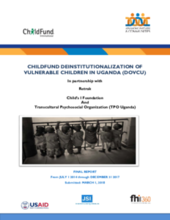From July 2014 through the end of 2017, ChildFund implemented the project, “Deinstitutionalization of Vulnerable Children in Uganda” (DOVCU). The project that was funded by USAID, lasted 42 months (July 2014- December 2017), and supported efforts made by the Ministry of Gender Labor and Social Development (MoGLSD) to implement its national Alternative Care Framework. DOVCU was implemented by a consortium led by ChildFund and its key partners Retrak, TPO and Child’s I Foundation. It operated in 12 districts with child care institutions, and in addition to supporting children to return to family care. DOVCU also carried out a process to identify households with children at high risk of separation and worked with them to preserve family care.
In consultation with DCOF, ChildFund prepared a thorough final report on DOVCU, which identifies its successes as well as some shortcomings and key learning that is directly relevant to other projects working to support family care for children.
At district level and below, the project worked in conjunction with local government personnel and local para-social workers. It worked with and through child care institutions (CCIs) to support children’s return to family care. DOVCU also supported work to enable street-connected girls and children in five government remand homes to return to family care. Two activities that were singled out as very useful were the training on parenting skills and the un-conditional, but well-prepared cash support provided to vulnerable households.
“[A] total 1,743 from the supported CCIs (1,465), remand homes (74) and children from Mbale Street (204) and 5 children who are in the process of domestic adoption (foster care)” were reunified with their families.
Through a multi-stage process (see pages 55-57), DOVCU identified 2,543 families with at least one child at high risk of separating, then provided support to preserve family care. As part of this process, DOVCU personnel interviewed children and care givers in CCIs to identify push and pull factors that led to family-child separation.
The project developed “Team Around the Child” groups of local governmental and non-governmental personnel which served as gatekeepers for admissions to CCIs and to reviewed proposed plans for family reunification and support for reintegration. A total of 1,150 admissions of children into CCIs were prevented.
It was operationally significant (and challenging) that DOVCU found that children had been taken into (in some cases recruited) child care institutions from over a wide geographic area, which had major operational and cost implications regarding location of families, case work with them, and monitoring the well being of children returned to them.
In addition to the final project report, DOVCU prepared three learning briefs on key aspects of the project:
- DOVCU Learning Brief 1: The effect of DOVCU’s integrated package of interventions on children and families at risk of separation
- DOVCU Learning Brief 2: The effect of DOVCU’s integrated package of services on reintegrating children and families
- DOVCU Learning Brief 3: Examining the effects of DOVCU through a gender lens
Also available: 'Endline Evaluation Report of Deinstitutionalization of Orphans and Vulnerable Children Project in Uganda'

